Black Midi – crusade against the unnecessary
The industry scrambled over an unlikely hype band just pleasing themselves with awkward sounds
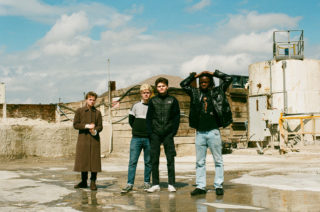
The industry scrambled over an unlikely hype band just pleasing themselves with awkward sounds
Whether they like it or not, Black Midi are an enigma.
Since I first heard about this group, a year or two ago in a South London pub, I’ve been intrigued by the idea of this band. “Yeah, it’s like math rock but with better riffs and a weird singer,” the rumours would go. “Like some mad jazz/punk thing”; “incredible drummer”; “they look about 12”, and so on. How was a group like this, apparently so difficult, elusive, and challenging, being touted as a hype band? We’re not talking about Viva Brother here.
I’ve seen them play a few times since, and each time I’m left with a cocktail of emotions: partly awestruck by their sheer technical prowess – particularly from drummer Morgan Simpson – partly thrilled to see a genuinely awkward band inspire such a reaction in people. Yet most lastingly, I’ve been a little reserved as to how truly revolutionary this group could be, even with their teeming ideas and obvious ability to make caustic sonics appeal to a diverse audience. Yes, they make a formidable racket and can really fucking play, but it’s been difficult to silence the insistent voice telling me that Black Midi are essentially a pretty good math/noise band who happened to have stumbled across the zeitgeist. Also, a female friend had this to say about them, and whether or not it’s entirely fair, it stuck with me: “If they were women, or a couple of years older, there’s no way people would be taking them this seriously”.
I’ve always been very keen to have my mind changed on these reservations though, and as I listen to their debut album while preparing for my interview with the group, I think it has been.
Schlagenheim, their first LP, comes out on June 21 via Rough Trade. The title literally translates from German as “hit home”, and if that’s the record’s mission statement, it’s certainly fulfilled. As debut albums go, this is uncompromising, clear-eyed stuff, and all the better for it. Whatever criticisms one may have of Black Midi, there’s no questioning their intensity and clarity of purpose. This record makes an impression all right.
The LP focuses some of the more outré elements of the live show, trimming the fat from the mid-song jams and placing a greater emphasis on consistent grooves and impressionistic, stream-of-consciousness vocal work. It’s in these more streamlined moments that Black Midi truly excel: the brutal climax of debut single ‘bmbmbm’, for example, or the vertiginous, desperate rush of ‘near DT, MI’, for my money the album’s standout track.
The jury’s still out on other parts of the record. As technically masterful as they all are, they do have a tendency to obscure the direction of their tracks in the service of showy flourishes and pushes. It’s a shortcoming that’s compounded by the fact that when they do regain their sense of cohesion, such as on closing track ‘ducter’, their playing is fabulous, astonishingly precise and bristling with invention. And for all the album’s occasional extremity, it’s often difficult to identify an emotional core with which to fully engage; frequently, you’re left admiring the abilities of Black Midi, but not entirely falling in love with them.
Yet maybe that’s all part of the allure, and I’ll gain a great deal from speaking to them at length, discussing their motivations, contextualising Schlagenheim on a more personal level. Maybe.
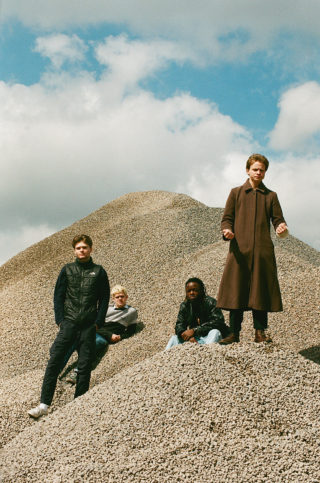
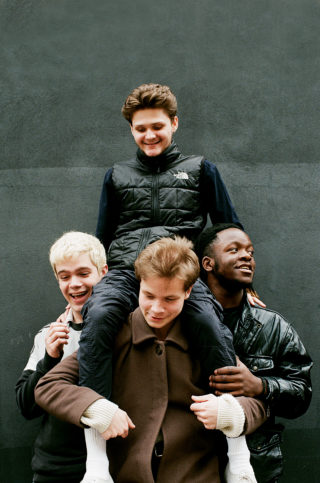
We meet at the band’s studio in South West London – a small room in a grandly dilapidated terrace, on an overcast April morning. They arrive one-by-one, raffish guitarist Matt Kelvin first, then quiet, polite bassist Cameron Picton, gregarious drummer Morgan Simpson, and finally, de facto frontman Geordie Greep. Once they’re all assembled they waste no time in striking up into an improvised “private set”, myself the sole audience member.
What follows is pretty special. Without a word as to what they’re going to play, they slide into a lithe, sprightly groove, Simpson’s painterly drumming providing a sleek counterpoint to the droning, gaseous textures conjured by his bandmates. From there, they move through a remarkable procession of moods and timbres, improvising masterfully in a way that recalls the “spontaneous composition” of forebears like Can and Talk Talk. They have that way of playing together that verges upon the telekinetic, each note nestling snugly against the next, each groove greasing the wheel of another. Perhaps it’s the early hour, but their playing seems relatively tranquil to my ears, markedly more serene and restrained than I’ve seen at their frenetic gigs. A little unexpectedly given this band’s noisy reputation, this comparative lightness of touch rather suits them.
After twenty-five minutes or so, they gradually conclude their improv, each member finding a graceful way of disentangling himself from the jam. Picton picks up the handheld recorder next to him, that I hadn’t noticed until now, and grimaces. It’s not been working for most of their set.
This, it turns out, is how they set about writing their complex, restless music, as Kelvin explains.
“We’ll record everything, then listen back to that for things we really like and take it from there. Latch onto a single bit at a time, then take other bits, and mash them together.”
“There’s a lot of scaling down,” says Simpson. “We’ll listen to the recordings individually, and different people will like different bits, which makes it kind of cool.”
Each improv session will usually last around two hours, with each initial phase of a new composition being entirely collaborative and spontaneous. “We just get in the zone,” says Greep. “Usually the first hour of jamming is rubbish, then after that it gets good. You warm up, and then it all just gets going. You need to get to a point where you just stop thinking about it.”
They’re an unusual bunch in conversation. Simpson and Greep do the majority of the talking, and their manner contrasts sharply, the former relaxed and effusive, the latter rather more intense, prone to a withering stare or a monosyllabic answer when my questions don’t interest him. He’s a puzzling presence throughout, steely-eyed and detached, yet not unfriendly. At one point during the interview he produces a packet of obscurely-named biscuits from somewhere within his long, Cossack-style overcoat, and offers them to me sweetly. I politely decline, slightly wrongfooted by his sudden shift in character, to the visible amusement of his bandmates.
I suspect that this slight oddness, the occasional incongruities between the four band members, has only added to their secretive reputation. I ask whether they’ve actively cultivated that air of mystery, and whether they like the label now that it’s been attached to them.
“No, and no,” asserts Picton sharply.
Simpson expands. “It basically just came from one article. We never set out to be hard to find. I guess the whole mystery thing is the lack of activity on social media, but that’s not a lack of anything – we’re posting what people wanna see, just the information that’s needed.” It’s true: look at their social media presence, and it is fairly sparse, but they do share all their live dates and link to where their music is available online. They’re not hiding anything.
“But yeah, that NME article, saying we’re mysterious, was one of the first things that was written about us, so it set the tone for what followed,” says Simpson. “But it’s just made up.”
Picton laughs wearily. “That article was funny as well, cos they were like, ‘the band have no recorded music whatsoever, you can’t hear them anywhere’, and then at the bottom it linked to the NTS session, which then linked to three other tracks that you could’ve listened to at the time. They were all studio quality too – it was a live recording, but it was in a proper recording studio.”
I can tell how irritating they find all this, but they seem glad of the opportunity to dispel a few misconceptions. Greep, however, is relatively conciliatory about the media’s representation of the band.
“They need some angle to have it, so ‘mysterious’ is the angle innit. But we’ve just done everything we thought was necessary and nothing we thought was not necessary. So that’s it.” He catches my eye, and repeats. “Nothing unnecessary.”
This becomes a theme of our conversation. Black Midi’s approach to many things is driven by a certain pragmatism, a matter-of-factness that’s far more straightforward than any of the contrived secrecy with which they’ve been caricatured. They have little time for the excesses of the music industry, and are unsentimental about their work, repeatedly saying how they just want to keep moving forward and changing things up, referring to songs by humming their tunes rather than using song titles, which Greep dismisses as “throwaway”.
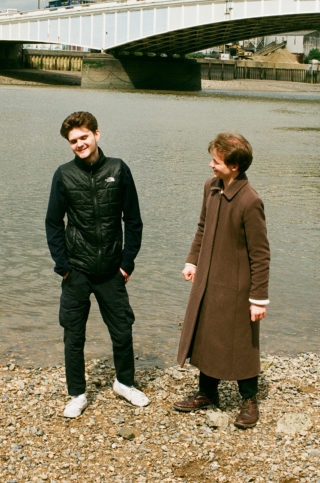
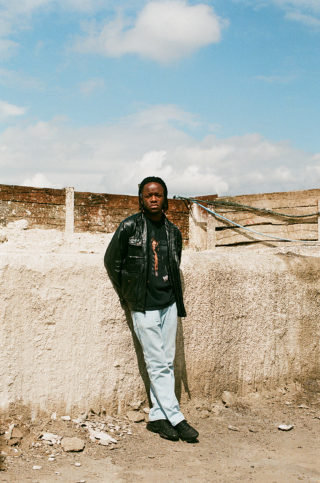
The four members of Black Midi met at the BRIT School in Croydon. Billed as the UK’s leading performing arts school, it’s not a fee-paying institution, but its star-studded list of alumni (Adele, Amy Winehouse, The Kooks, Katy B) means that places are in high demand. Despite this hit parade, the band are quick to point out that the school is still very encouraging of more awkward, experimental modes of expression.
“The stereotypical image is always gonna be of the people who’re most successful, which is never gonna be the ones doing crazy stuff,” says Greep. “But really there’s a lineage of people doing interesting stuff, and it’s encouraged to play different types of music.”
“Again, the public view isn’t really representative,” sighs Picton.
They all commuted to BRIT from different corners of London and the surrounding area: Greep from Walthamstow, Picton from Wimbledon, Kelvin from South Croydon, and Simpson from Hertfordshire. Greep says that they “jammed with loads of people”, but the project that would become Black Midi was the one that really stuck. In the beginning, it was just he and Kelvin.
“We were doing a droney, Godspeed, Swans, Boredoms thing,” says Greep. “Just with guitars, and originally when we were jamming I’d play an organ patch on a pedal, doing this ambient guitar stuff for three hours at a time. It was funny.” He describes everything as funny.
“Me and Matt went to BRIT for four years, the others for two. When Morgan joined it became a more like rock/funk thing, but it didn’t come together fully until Cameron joined, a month before our first gig. Then we rehearsed all the day beforehand, and did it at The Windmill.”
The Windmill, a semi-legendary independent venue halfway up Brixton Hill, has become the focal point for much of the scene from which Black Midi emerged eighteen months or so ago. Synonymous with the early shows for many breakout South London acts (Fat White Family, Shame, Goat Girl et al) over the past five years or so, it proved the perfect place to develop their nascent sound.
“Tim [Perry, Windmill booker] gave us so much good advice,” says Picton reverently. “Without any specific allegiances apart from just protecting the interests of The Windmill and making sure it thrives as a venue – he wasn’t trying to manage us or anything. All he wants is for the bands that play at the Windmill to do well. We didn’t really play many London venues more than once, but we kept coming back there.”
Greep nods along. “They always have interesting people on.”
“Great Dad, Jerskin Fendrix, Black Country, New Road…” lists Picton.
“We kind of saw Damo Suzuki from behind, cos we played with him, that was amazing,” adds Greep. The band performed as “sound carriers” for the legendary Can frontman last year at one of his semi-regular improvised sets. They’re typically nonchalant when I ask how that came about. “Tim just put us forward for it,” Greep shrugs.
In another characteristically unsentimental move, the band are keen not to overplay the “South London thing”. As they’ve already mentioned, they’re not all from the area, and although they owe a great deal to two South London institutions – The Windmill and BRIT – they’re tiring of what they see as yet another act of lazy pigeonholing on the part of much of the music press.
“That whole South London scene thing – I’m sure many bands feel pissed off that they’ve been categorised in that way,” muses Picton. “There’s obviously a scene, but to categorise it into a sound is difficult. Lots of those bands aren’t even from here – we’re not really. It’s obviously good to have a scene, with lots of good venues that support new people making music. Independent venues are important for any town, and I think you’ll find a version of the scene here in any place with a good independent venue, with music that’s just as good as what’s coming out of London. It’s just that this is the city where the music industry… hovers around.” Not for the first time, the music industry is characterised by Black Midi with hostility, a leech-like distraction from the important business of making work.
They may not love the industry, but it certainly loves them. Although few of the details were made public, countless whispers spread about record labels and booking agents alike piling into a bidding war for the band, the magnitude of which is rarely seen in these apparently lean days for the music business. After months of negotiation, the band eventually signed to Rough Trade – a legendary label, yes, but with its Smiths/Libertines indie pedigree (or baggage, depending on your point of view), it’s not necessarily the most obvious choice for this altogether more caustic group.
Every time I approach the specifics of their relationship with record labels though, the already-reserved band clam up even further. Clearly, this isn’t of interest, so I don’t force the issue. Yet they don’t resist the wider industry entirely; they’ve all worked variously as session musicians, and Simpson in particular continues to do so alongside his main project.
“I grew up playing gospel music in church, so the idea of playing in a band like this would never have been in my mind ten years ago,” he enthuses. “But my parents play, my sister plays, and I used to play with them every week at church, but they were session musicians on the secular circuit as well. At a very young age I was fortunate to learn how to play with people, which a lot of people don’t get exposed to until they’re teenagers.
“Essentially, I’ll play whatever. I try to do it alongside this as much as possible, ‘cos I enjoy it. It keeps things fresh, gives me a different way of thinking. I wouldn’t be able to play this kind of stuff in a pop gig though – I’d get chucked out in a couple of seconds!” He laughs heartily.
Greep chimes in, suddenly animated. “It can yield some funny results, doing this and then doing something else. One time I was doing this church gig, and I’d adjusted my pedalboard for something we’d been doing at school, and I forgot that I’d changed it all. We were in the middle of a song, and I went to do this nice chord – ‘briiiiinnnggg’, yeah? – and thought, I’ll add a bit of chorus, that’d be nice. But I turned on the ring modulator by accident, it made this crazy noise and everyone just looked at me, like ‘what the fuck are you doing?!’. That was peak.”
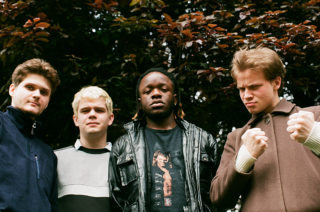
After their initial shows at The Windmill (“The only place we played for a good six months,” says Picton. “Nobody else was interested.”) and a handful of higher-profile support slots, Black Midi formalised their relationship with the venue with a residency. As they were putting together the bills for each show, they spotted an opportunity.
“Tim Perry kept recommending this guy Dan Carey to us to record with,” says Greep, “so we decided to get Dan to come and play one of the nights. He played on the first night, and his band, Scotti Brains, were really good. We played, he liked it, he said, ‘yeah, come over, I wanna do that song that goes boom-boom-boom’, and that was it.” He stops abruptly. He does that a lot.
Carey, a highly influential figure in the development of many new South London acts, runs cult indie label Speedy Wunderground. ‘bmbmbm’ – another example of a more formal song title being shirked in favour of basic onomatopoeia – became their first single, released in May last year to rapturous acclaim. By that point, word had spread about this thrilling new band, partly thanks to the aforementioned NME article and NTS session. They paid little attention to the hype, though, and kept working at their craft at a frenetic pace, gigging relentlessly and finding time to work on more recorded music in between. Predictably, this impressive pace simply seemed like the natural thing to do for the four young men in the eye of this media storm.
“By the time it got to the point of making the album, we just recorded the songs we’d been playing at gigs,” explains Greep. “Most of them went through that process of scaling down and tweaking live, but by the time we were recording them for the album, we knew them really well.”
I ask if the songs feel old to them now, whether they’re keen to get them out into the public eye and move swiftly on now that the album is done.
Greep: “Yeah, but the way we’ve recorded them is different to how we play them live. We set out to make this different from the live thing; make the recordings stand on their own.”
“They don’t feel old, but we just want to keep moving,” adds Simpson. “At no point are we like, ‘cool, we’ve got these songs, let’s chill out’. Not that we’re not happy with what we’ve got, but there’s a natural drive forward.”
Somewhat unbelievably, some of the album tracks go all the way back to Kelvin and Greep’s brief stint as buskers in suburban Bromley. I find it hard to imagine hearing songs like ‘ducter’, the album’s jerky, shapeshifting closer, on my way to Gregg’s.
“We had all the parts [to ‘ducter’] and everything,” says Greep. “We were just jamming on the street, making it up. We worked out a lot of the arrangement there and then. We didn’t learn it as a band for ages. Just with electric guitars, a portable amp, delay pedal… it was funny.”
All four band members are enthusiastic when talking about making Schlagenheim with Carey. Greep lays out the process: “We did all the main stuff live and then added overdubs. Dan had this way of mapping the tempo onto the changes of the track so we could still sequence stuff onto it properly. He doesn’t try and direct us too much, but he’s not an Albini-style ‘just capture what’s in the room’ type either. He lets us do our thing but he has his own sound. It’s like the Beatles or something, making a recording for its own sake.”
“It’s a collaboration,” contributes Picton. “We’ve worked with other producers, with varying degrees of success, and it tends to be that the more relaxed the sessions are, the better. The best one that wasn’t with Dan was just in this guy’s bedroom, but we’ve done other ones in high-end studios, strictly to click, and we struggled. We’d get mixes back and they’d be lifeless.”
“Not to say those people aren’t good at their job – it just didn’t work for us,” Simpson reiterates, ever the diplomat.
Greep fixes me with another hard stare. “There’s a bit of an obsession with tempos not changing, and the isolation of instruments,” he says. “But if you put on any sick album, and count along with the tempo, it speeds up and slows down all the time and no one notices. Same with the isolation thing – no one cares.”
Simpson agrees. “It’s not the main focus. It doesn’t need to be.”
They’re all emphatic about the record being a standalone artefact; an entirely separate entity to the live experience.
“We all played different instruments on the album,” says Greep. “I played synths, piano and accordion, Matt played banjo… the whole point is we don’t wanna reproduce the album exactly live.”
“And it’d be impossible,” adds Simpson. “We’d have to hire four or five different musicians to do it. But it wouldn’t make any sense to be in a studio environment and not use what’s around you to enhance what you’re making.”
Greep is clear on this. “I don’t like paying to see a band and hearing something I could’ve heard at home. When you start trying to do that you’ve lost the energy. It’s pointless.” Again, they’re at pains to distinguish between what’s necessary and what isn’t, what’s valuable and what holds no interest for them. Their clarity of vision is striking.
The other thing I want to raise with the band is their technical accomplishment. Alongside Greep’s unhinged, squawking vocal style (a product of his desire not to simply ape “that macho thing that all the other guitar bands do”), it’s one of the aspects of the band’s sound that most divides opinion. They’re clearly technically excellent, but some people – myself included – aren’t always convinced that they manage to strike the balance between using those skills to serve their musical context, and simply flexing their considerable instrumental muscle.
“It’s not really a consideration for me,” says Greep, a little dismissively. “If you’re playing a lot, you’ll get more able. A lot of the music that I’ve liked over the years has been more demanding to play, and I just wanted to be able to play like that.”
I put it to him that limitations, however, can breed creativity, and sometimes being able to play whatever you want can be a little overwhelming.
“Yeah, for sure,” he replies. “But in the same sense, those limitations don’t necessarily make it good either. I know what you’re saying, but neither one is always good. It’s like the whole thing of drugs or no drugs making you more creative – neither is a guarantee.”
On Schlagenheim, Black Midi’s technical skill allows them to move through their innumerable ideas extremely quickly and fluidly. Throughout, I’m reminded more of the compositional style of electronic producers like Blanck Mass and Aphex Twin than the milieu of punk and garage bands from which they’ve emerged.
Simpson agrees with this. “Absolutely. We’re obviously a guitar band, but we don’t look at it like that. Don’t necessarily label things – the moment you do that, there’s only so far you can go. It’s the same with what we’re influenced by.”
“I don’t know if we’d go full Kraftwerk though, and ditch our instruments completely,” says Greep. “We need more control. But maybe for a couple of tunes, you never know…”
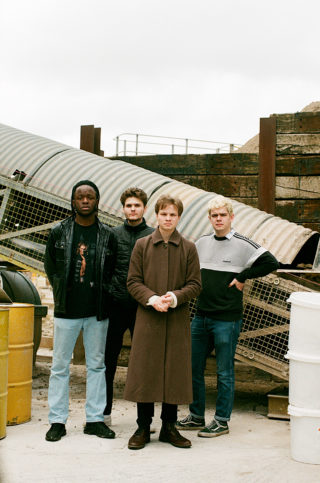
As I wrap up the interview, we discuss what comes next for the band, once this album is released. In a good-humoured way, they’re a little evasive, keeping their cards close to their chest.
“Hopefully it’ll sell a million copies,” Greep says, his deadpan tone inscrutable as ever. After all, it’s unlikely that a band as challenging as Black Midi will truly break through to the arena-level mainstream, but their rise has been meteoric so far; stranger things have happened. “Then we’ll retire and chill out.”
“We’ll all go and live all over the world and rehearse like twice a year,” suggests Picton. “Make an album out of that and put it out whether it’s shit or not.”
Simpson is a little more sincere. “An album is literally just a snapshot of an artist at that time. Up til the release of the album, that’s been our sound. Hopefully in two years’ time, it’ll be different.”
“As long as it keeps changing, we’ll keep going,” agrees Greep. “Don’t wanna be zombies playing the hits.”
< Onwards >
Walking back to the train station after the interview, I think I finally get it. Black Midi’s appeal lies in their central contradiction: not only are they a preternaturally adventurous, progressive group, but a flawed, human one too.
As determined as they are to push forward and create something truly new, they seem unafraid to throw their ideas around, using whatever resources they have to hand (instrumental technique included), and see what sticks. In a way, their motivation is very simple: the pursuit of a thrilling, original sound. Whether they cause dismay or division along the way is immaterial, because soon enough they’ll have transformed again, discarding all but the most forward-looking elements of their craft in the service of continuous discovery.
If there’s one quality that most characterises this band, it’s a commitment to the necessary; perhaps most impressively of all, they have an acute understanding of what qualifies as such that belies their youth. Regardless of one’s opinion of their output so far, that commitment alone makes them a group to cherish.